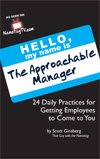
 FIRST: Pinpoint self-interest.
FIRST: Pinpoint self-interest.
Let me share four words that changed my life forever:
I know. It’s hard to wrap your head around that. But it’s true.
People don’t care how good you are – they care how good you’re going to help them become. People don’t care what you’ve done – they care what you’ve learned, and how those lessons can help them. And people don’t care if you’re having a bad day – they care how you’re going to help them have a better day.
Try these Phrases That Payses to let people know that you understand what’s important to them:
1. “I know how much this means to you”
2. “I can see this is important to you”
3. “Jim, you obviously wouldn’t have knocked off that jewelry store if you didn’t love your wife.”
Also, here’s another exercise that will keep you focused on whoever your “them” is. Ask yourself the following questions, each of which can be phrased for individuals or groups of people:
o What is this person’s success seed?
o What is the key to this person’s heart?
o Who does this person need to look good for?
o What is #1 on this person’s Self Interest List?
o What does this person’s self-interest hinge upon?
o Who can hurt this person the most, and how can I address that?
o What underlying objective or goal does this person’s role create?
SECOND: Think on paper.
Writing makes everything you do easier. Writing brings clarity and untangles threads. It’s also a form of self-communication.
So, before officially approaching your coworker or boss, I suggest you collect and organize your thoughts first. SEE what you’re thinking. This makes it easier to articulate everything you want to say when the time comes, almost like you’re tapping into a reservoir of insight.
THIRD: Create a listenable environment.
When you walk into someone’s office or sit down, start off by asking, “Is this a good time for you to listen to me?” If yes, proceed to speak. If not, ask them, “When would be a good time for you to listen to me?” These questions reinforce your commitment to creating listenable environments.
Also, ask yourself: Is this setting conducive to listening? What around you might be distracting someone from listening to you? How could you put yourself in the most listenable position?
FOURTH: Give people the meat.
Look. People are really, really busy. They simply don’t have time to listen to or read everything you’ve got for them.
In short: You need to cut to the chase.
You need to approach your conversations, emails and encounters with a greater mindfulness of the A.D.D., hyperspeed and instant-gratification-nobody-cares-about-you culture in which we live.
In his famous book, The Ten Rules of Writing, Elmore Leonard advised, “If you want to write a great book, just leave out the parts people skip.”
Wow. What a concept. I wonder what would happen if you applied that same rule to emails, phone calls and conversations? (People would probably listen to you a LOT more, that’s for sure!)
Ask yourself: Is what I’m about to say or write something other people would usually skip? If so, take it out. Trim the fat. Become known as a filter. A distiller. A walking Cliff’s Note Machine.
Everybody will want to be around you because people are just DYING for someone to cut all the crap out for them and just give them they good stuff.
REMEMBER: Humans are carnivores and they’re hungry. Feed them with your value. What parts of this email do you need to leave out? Is what you’re about to say rooted in value or vanity? And, if you ran a Body Mass Index of your last presentation, email or conversation, what percentage of it would be pure pudge?
FIFTH: Send a summary. At the end of the conversation or meeting, say this: “Mark, I’ve been writing down a few notes today. When I get back to my office, I’ll send you an email with quick, bullet-point summary of our conversation. That way we’ll be the same page.”
Almost NOBODY will reject this suggestion. Especially a manager. It’s a time saver for them. It’s also bookmark on the conversation so they don’t have to remember anything.
Or, if they DO forget something, they’ll always have a handy reference guide for confirmation. What’s more, on your side of the conversation, this practice shows initiative, demonstrates effective listening and proactive communication, plus it establishes joint-accountability.
LET ME ASK YA THIS…
What’s your secret for approaching your coworker or boss with a concern?
LET ME SUGGEST THIS…
For the list called, “26 Rapid-Fire Strategies for becoming the Most Approachable Person in Your Organization,” send an email to me, and I’ll send you the list for free!
* * * *
Scott Ginsberg
That Guy with the Nametag
Author, Speaker, Coach, Entrepreneur
scott@hellomynameisscott.com
 If they can’t come UP to you; how will they ever get BEHIND you?
If they can’t come UP to you; how will they ever get BEHIND you?
Buy Scott’s new book and learn daily practices for becoming a more approachable manager!
Pick up your copy (or a case!) right here.
